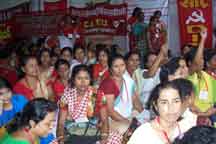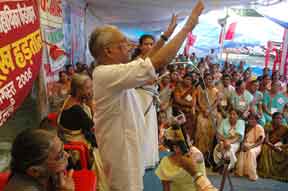 People's Democracy
People's Democracy
(Weekly
Organ of the Communist Party of India (Marxist)
No. 33
August 13, 2006
(Weekly
Organ of the Communist Party of India (Marxist)
|
Vol.
XXX
No. 33 August 13, 2006 |
Historic Ten-Day Struggle Of Anganwadi Employees

Anganwadi employees at the relay hunger strike camp at Jantar Mantar
Hemalata
FOR ten days from July 25, 2006, it looked as if the area surrounding Jantar Mantar in the heart of the national capital was under the siege of the anganwadi employees who thronged into the city to voice their demands. Around 20,000 anganwadi employees from 22 states – Andhra Pradesh, Assam, Bihar, Chattisgarh, Delhi, Gujarat, Haryana, Himachal Pradesh, Jammu and Kashmir, Jharkhand, Karnataka, Kerala, Madhya Pradesh, Maharashtra, Orissa, Pondicherry, Punjab, Rajasthan, Tamil Nadu, Uttar Pradesh, Uttaranchal and West Bengal – participated in the historic ten day mass relay hunger strike organised by the All India Federation of Anganwadi Workers and Helpers, affiliated to CITU.
These anganwadi employees were demanding that the Integrated Child Development Services Scheme, the flagship programme of the government of India for the welfare of children below six years, pregnant and lactating mothers be made permanent and the anganwadi workers and helpers, the most important functionaries and the livewires of the programme at the local level, be recognised as Grade III and Grade IV government employees. Pending this, they wanted immediate enhancement of their remuneration, provision of Dearness Allowance with automatic linkage to the Consumer Price Index, Provident Fund, ESI, and pension facilities and payment of ex gratia on retirement and a tripartite mechanism at the national level to resolve their issues.
The trade union movement of the country has several heroic struggles to its credit. It has organised several strikes in which hundreds of thousands of workers have participated; it has organised massive mobilisations in the national capital on the demands of the working class. But this form of struggle in which every day nearly two thousand workers sat and slept on the streets for 24 hours till the next batch came to relieve them, was unprecedented in the history of the trade union movement of our country. It is significant that this historic struggle was conducted by working women dispelling the generally held opinion that women do not participate actively in trade union activities. It was inspiring to see the determination with which the anganwadi employees continued their struggle in spite of the heavy rain that lashed the capital for the first three days and in the hot sun that followed. The continuous rain, the leaking tents and the wet carpets could not dampen the spirit of these women workers.
OVERWHELMING RESPONSE
The response of the anganwadi employees to the call of the Federation for the ten-day relay hunger strike was generally overwhelming. Even from states like Bihar, where the union was not very strong, thousands of anganwadi employees participated in the struggle. The participation from the Hindi speaking states was particularly encouraging. The participation from Uttar Pradesh, Rajasthan, Gujarat, and Madhya Pradesh etc was more than expected. The largest contingent came from Punjab, followed by Karnataka, Andhra Pradesh, Bihar and Haryana. The large influx, the arrival of a thousand when only one or two hundred were expected, led to some volunteers calling it a ‘tsunami’. This overwhelming response along with the rain and lack of sufficient accommodation, created lot of difficulties, but no one was complaining. The miserable conditions under which they were working, the severe exploitation and harassment to which they were subjected, have made them realise that there was no alternative but to fight. The call of the Federation came at the right time and correctly reflected the mood of the anganwadi employees.
The cultural diversity of the country was also on display in the pandal. Though they spoke different languages, they devised ways to communicate with each other. The anganwadi employees from Tamil Nadu responded to the Punjabi slogans; those from Andhra Pradesh danced to the songs from Himachal Pradesh. In spite of thousands participating in the relay fast, it was very disciplined; there was continuous slogan shouting and songs and dance on their problems and demands; many anganwadi employees demonstrated their creative skills by writing songs and poems on the spot on their problems and struggles.
M K Pandhe, president of CITU inaugurated the ten-day struggle programme. Chittabrata Majumdar, general secretary of CITU participated in the concluding session. Both of them as well as several office bearers of CITU regularly visited the pandal to express their support and solidarity. The CITU extended full support to the struggle and made all the arrangements to make it effective. A three-member team of CITU secretaries functioning from the centre – W R Varada Rajan, Dipankar Mukherjee and Hemalata – regularly guided the struggle and extended all the necessary help.
WIDE SUPPORT
The struggle received wide support from different sections of the people. Leaders of several trade unions including those in insurance, banks, state government and central government employees, medical representatives, BSNL and other public sector undertakings, organisations of the workers in the unorganised sector etc congratulated and greeted the fasting anganwadi employees and extended their solidarity. Leaders of mass organisations of kisans, agricultural workers, women, youth and students extended their solidarity. On each day a leader of CITU concluded previous day’s fast and a leader from other mass organisations started the fast by garlanding the leaders of the state delegations. Progressive artists from Jana Natya Manch regularly visited the pandal and performed street plays. A group from Janasanskriti also came to greet the delegates.
The AIFAWH wrote letters to all the parliamentary party leaders requesting them to raise the issues of anganwadi employees in the Parliament. When the issue was raised by the CPI(M) in both the Lok Sabha and Rajya Sabha, many MPs, irrespective of the political parties to which they belonged, associated with the issue. Every day 4-5 MPs from CPI(M) visited the pandal and extended their solidarity. More than 70 MPs collected signatures on a memorandum to the prime minister requesting him to consider the demands of the anganwadi employees favourably.

Kerala chief minister V S Achutanandan greeting the anganwadi employees at the hunger strike camp
The chief minister of Kerala V S Achutanandan and some other ministers in his cabinet including P K Shrimati, minister for women and child development, visited the fasting anganwadi employees and extended their support. The chief minister of Tripura, Manik Sarkar, wrote a letter to the prime minister urging him to favourably consider the genuine demands of the anganwadi employees and sent a copy to the Federation along with a letter supporting the demands of the anganwadi workers. Prakash Karat, general secretary of the CPI(M) also visited the fasting anganwadi employees and demanded the government to fulfil their genuine demands.
PRIME MINISTER’S ASSURANCE
A delegation led by Sitaram Yechury, leader of the CPI(M) parliamentary party and Polit Bureau member of the CPI(M) and comprising of Chittabrata Majumdar, MP and general secretary of CITU, Tapan Sen, MP and secretary of CITU, Basudeb Acharia, MP and working committee member of CITU along with Neelima Maitra, president, Hemalata, general secretary and A R Sindhu, treasurer of AIFAWH, submitted a memorandum to the prime minister Dr Manmohan Singh on August 3, 2006.
The prime minister agreed that ICDS was a very important service for the children and women of our country and informed that his government was committed to expand it. He also conceded that anganwadi workers and helpers, the key functionaries of ICDS were ill paid and assured that the government would increase their remuneration. He also agreed that they should be paid compensation when they are asked to retire after working for more than 20-25 years. He assured that he would discuss with the minister for women and child development and take the necessary measures.
Sitaram Yechury participated in the concluding session on August 4 and congratulated the anganwadi employees. He assured of all help to pressurise the government to concretise the few assurances that have been made by the prime minister and for the release of the relevant Government Orders at the earliest. M K Pandhe, Chittabrata Majumdar, and other office bearers of CITU also participated in the concluding session and congratulated the anganwadi employees and the AIFAWH for the heroic struggle on their demands. They exhorted them to continue their struggle till their demands were achieved. They pointed out that the struggle for regularisation of their services was linked with the struggle to reverse the anti working class policies of the government. They urged the anganwadi employees to join the campaign of the Sponsoring Committee of Trade Unions and the general strike on December 14, 2006 against these policies.
The anganwadi employees reiterated their determination to intensify the struggle if these assurances are not translated into concrete actions and the relevant Government Orders are not released at the earliest. They decided to continue the struggle till the realisation of the major demand of regularisation.
The Working Committee of the Federation, which met on August 5, has decided to conduct a wide campaign about the struggle programme among the anganwadi employees by holding sector/ project/ general body meetings and distribution of leaflets in the month of August. Project level demonstrations/ dharnas/ processions etc would be held in the month of September. Post card campaign by sending post cards to the prime minister with a copy to the minister for women and child development would be conducted in the months of October and November. It has also decided to hold state/ district level rallies during the winter session of the parliament.